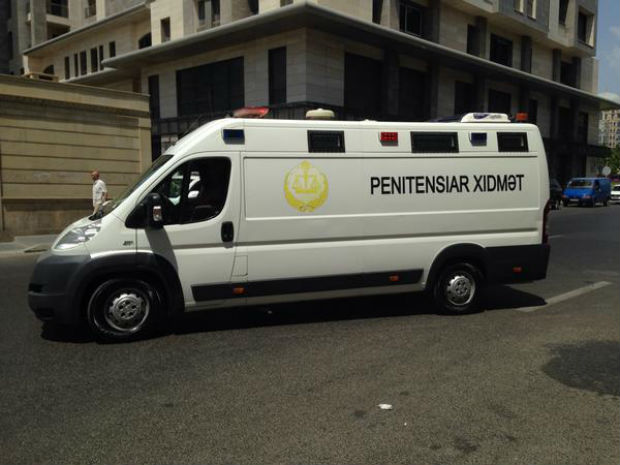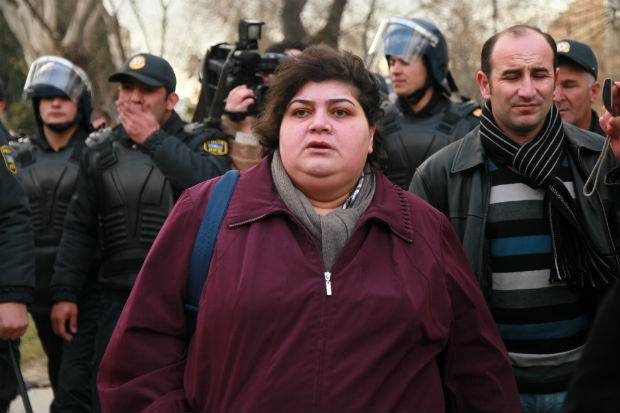Index relies entirely on the support of donors and readers to do its work.
Help us keep amplifying censored voices today.
It should have been a happy day for Leyla and Arif Yunus. On 15 July, the couple — together for 37 years — saw each other for the first time in 11 months. The circumstances of their reunion, however, put a damper on what would otherwise have been a joyous occasion: it took place inside a glass cage, in a cramped courtroom in Baku, Azerbaijan. The human rights activists are on trial, on charges widely recognised to be politically motivated.
Initially scheduled for 13 July, but pushed back for unknown reasons, the Yunus’s pre-trial hearing came almost a year after they were first detained within days of each other in July and August of 2014. Leyla, director of the Peace and Democracy Institute, and Arif, a historian and researcher, have since been accused of an array of crimes, ranging from tax evasion and illegal business activities, to treason.
In the courtroom some 30 places were allocated to members of the public, who were stripped of their phones at the start of proceedings. Representatives from the German and EU embassies, as well as local journalists and NGOs were in attendance, according to Kati Piri, a Dutch member of the European Parliament who travelled to Baku for the trial. She estimated that more than half of the the crowd that had shown up, including other embassy delegations, did not manage to get into the room.
Piri told Index on Censorship that she was there to show support and solidarity for the couple, and that the European Parliament and the international community had not forgotten them and will continue to exert pressure.
“Even though the spotlight is no longer on Baku for the games, it will continue to be on when it comes to human right abuses,” she said, referring to the inaugural European Games, hosted with much fanfare by the Azerbaijani capital just weeks ago.
Proceedings lasted some 2.5 hours, and according to reports from inside the court, both Leyla and Arif looked pale and thinner. Leyla’s struggles with diabetes and Hepatitis C in prison have been well documented, but during the hearing she expressed worry in particular about her husband. Piri said Arif looked “much less strong and vivid than Leyla”. Their daughter Dinara told media in June that both her parents’ health has deteriorated since their arrest.

The van transporting Leyla and Arif Yunus (Photo: Kati Piri)
An appeal to the judges to allow Leyla to serve house arrest instead of imprisonment, was denied — as was every other motion filed by the defence, including a call for the case to be dropped altogether and a request that the couple be allowed to sit with their attorneys instead of the in the glass cages.
But Piri said Leyla seemed mentally very strong: “Mentally, they haven’t been able to break her.” Leyla took the opportunity, during a break in proceedings, to address the people in attendance, and according to Contact.az, she refused to stay silent even when the judge ignored her request to speak. “You are depriving me of the right to speak… I know that it is a false trial, but you have to give me an opportunity to speak…” she reportedly said.
The arrest of the couple in July and August 2014, was the first move in a crackdown by the regime of President Ilham Aliyvev, which has seen some of Azerbaijan’s most celebrated critical and independent voices arrested and sentenced on spurious, and frequently suspiciously similar charges, often relating to white-collar crime. Over the past few months, pro-democracy campaigner Rasul Jafarov has been handed down a 6.5 year sentence, while human rights lawyer Intigam Aliyev and journalist Seymur Hezi have been jailed for 7.5 and five years respectively. Award-winning investigative reporter Khadija Ismayilova is due in court on 22 July.
Leyla and Arif Yunus’s next hearing is scheduled for 27 July. While Piri remains hopeful of a positive outcome for the couple, she is afraid “it will not depend on the judges, but on politicians what will happen in this case”.
This article was posted on 15 July 2015 at indexoncensorship.org
In a letter to Azerbaijani President Ilham Aliyev, independent lawyers, barristers or attorneys-at-law, expressed concern over the sentencing of their colleague, human rights lawyer Intigam Aliyev: “We call upon you, Mr President, to immediately and unconditionally release Intigam Aliyev and rehabilitate his civil and political rights.”
After six months in detention on spurious charges Intigam Aliyev was sentenced to seven and a half years in prison.
“We identify with Intigam Aliyev”, the lawyers wrote, “because we believe everybody should have a right to a fair trial, just as he does. Yet, Intigam Aliyev’s trial was marred by procedural irregularities and violations of the right to a public hearing and the right to access the files and documents of the case.” In addition, Intigam Aliyev’s attorney managed to prove that he was not guilty of implementing projects without registration, which he was charged with.
All 95 lawyers expressed their sympathy for Intigam Aliyev, as a unique lawyer. Not only is he a teacher for a generation of young Azerbaijanis, but he is also an expert of the European legal system, one of the first Azerbaijani lawyers to utilize the European Court of Human Rights and the regional tutor in the Human Rights Education for Legal Professionals (HELP) programme of the Council of Europe.
In the letter the lawyers furter identified with Intigam Aliyev: “For all of us, being a lawyer is a unique privilege. We identify with Intigam Aliyev because in Azerbaijan, any of us could be arrested simply for doing the same work as he did.”
The lawyers included colleagues of Intigam Aliyev, from various Eastern European countries, from within the Human Rights House Network project International Law in Advocacy, of which he is the national expert in Azerbaijan. The signing lawyers also included lawyers invested in human rights, from the United States and Canada, Egypt or Iran, as well as western European countries.
Florian Irminger, head of advocacy at the Human Rights House Foundation, underlines the importance of supporting human rights defenders in Azerbaijan: “The imprisonment of Intigam Aliyev is part of a systematic crackdown on human rights in the country. Arbitrary detention has been used to silence critical voices in Azerbaijan for years, whilst at the same time they exhibit a modern state through major international events. This letter and attention from around 100 lawyers from three continents witness that the outside world are not fooled by the promotion.”
In their letter, the lawyers highlight that the detention conditions of Intigam Aliyev have an impact on his already poor health:
“He suffers from severe chronic headaches in addition to nerve pain and has reportedly been denied of appropriate health care to date.” In their letter, the lawyers urge the Azerbaijani authorities to respect “basic humanitarian principles” and ensure that Intigam Aliyev is receiving “complete and necessary treatment for all medical concerns.”

Rahim Haciyev, editor of Azerbaijani newspaper Azadliq, holds up a copy at the 2014 Index awards (Photo: Alex Brenner for Index on Censorship)
Index award-winning newspaper Azadliq, widely recognised as one of the last remaining independent news outlets operating inside the country, is facing imminent closure. This comes amid an ongoing crackdown on critical journalists and human rights activists in Azerbaijan, and as the country is hosting the inaugural European Games in the capital Baku.
A statement from the paper, quoted Thursday on news site Contact, outlined its “difficult financial situation”.
“If the problems are not resolved in the shortest possible time, the publication of the newspaper will be impossible,” it read.
“The closure of an independent media outlet like Azadliq, which Azerbaijani officials have suffocated over the past two years, flies in the face of repeated assurances from President Ilham Aliyev that his government respects press freedom. The fact that this financial crisis is occurring during the Baku European Games just underlines the shameful disregard that the Azerbaijani government has for freedom of expression,” said Index on Censorship CEO Jodie Ginsberg.
Azadliq has long faced an uphill battle to stay in business. Thursday’s statement merely detailed the latest development in a serious financial crisis, brought about at the hands of Azerbaijani authorities.
In July 2014, Azadliq was forced to suspend print publication. Editor Rahim Haciyev told Index that the government-backed distributor had refused to pay out the some £52,000 it owed the paper, which meant it could not pay its printer.
The paper has also seen its finances squeezed through being banned from selling copies on tube stations and the streets of Baku, and being slapped with fines of some £52,000 following defamation suits in 2013. The paper was also evicted from its offices in 2006 and its journalists have been repeatedly targeted by authorities. Seymur Hezi, for instance, was in January sentenced to five years in prison for “aggravated hooliganism” — charges widely dismissed as trumped up and politically motivated.
Azadliq — meaning “freedom” in Azerbaijani — has appealed to the public for help to stay afloat, urging “those who defend the freedom of speech in Azerbaijan” to join in the campaign to save the paper.
This comes after the Parliamentary Assembly of the Council of Europe (PACE) condemned “the crackdown on human rights in Azerbaijan”. In a resolution adopted on Wednesday 24 June, PACE called on authorities to “put an end to systemic repression of human rights defenders, the media and those critical of the
government”.
This article was posted on 25 June, 2014 at indexoncensorship.org

Investigative journalist Khadija Ismayilova is one of the government critics jailed ahead of the European Games.
Sustained efforts to silence critical voices by banning foreign journalists and rights groups tarnishes the inaugural European Games. Host country Azerbaijan has a dismal human rights record and has been involved in a crackdown internally on groups and individuals who speak out against the government: there are currently 80 political prisoners in jail, including award-winning investigative reporter Khadija Ismayilova, human rights lawyer Intigam Aliyev and pro-democracy campaigner Rasul Jafarov. Others are in exile or in hiding.
It is vital that external observers should be able to see and hear for themselves what is happening in Azerbaijan and the European Games provide an occasion to do just that. Sadly, Azerbaijan appears to be taking the same intolerant attitude towards foreign journalists and civil rights groups as it does at home. Journalists due to cover the games have been barred from entering the country, despite the European Olympic Committees’ commitment that it would uphold the Olympic Charter and would guarantee that media would be able to report freely.
The day before the opening ceremony and three hours before boarding his flight to Baku, The Guardian’s chief sports correspondent Owen Gibson learnt he was banned from reporting on the games. Earlier this week Amnesty was told it would not be able to present its report about human rights violations committed ahead of the games in Baku as planned and its representatives would not be welcome. Emma Hughes of UK-based non-governmental organisation Platform was barred from entering the country upon her arrival at Baku airport.
This is not acceptable. Azerbaijan’s actions are in direct contravention of the Olympic Charter. The European Olympic Committees (EOC) has the responsibility to demand Azerbaijan immediately reverses its decision to bar civil society groups and journalists from the country. Without such representatives, the EOC risks being complicit in a cover-up of human rights abuses in Azerbaijan, betraying the values and principles that are meant to lie at the heart of the Olympic movement.
Tomorrow, Index on Censorship will join Sport for Rights, Amnesty International UK, Article 19 and Platform for a demonstration in London calling for an end to the human rights crackdown in Azerbaijan, and the release of the country’s jailed journalists and human rights defenders.